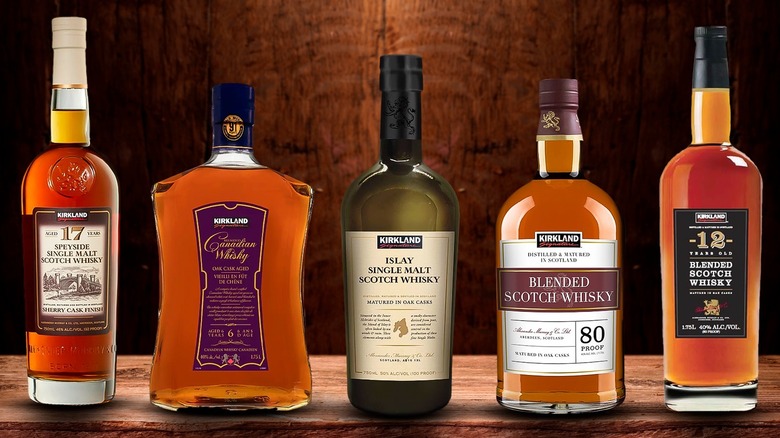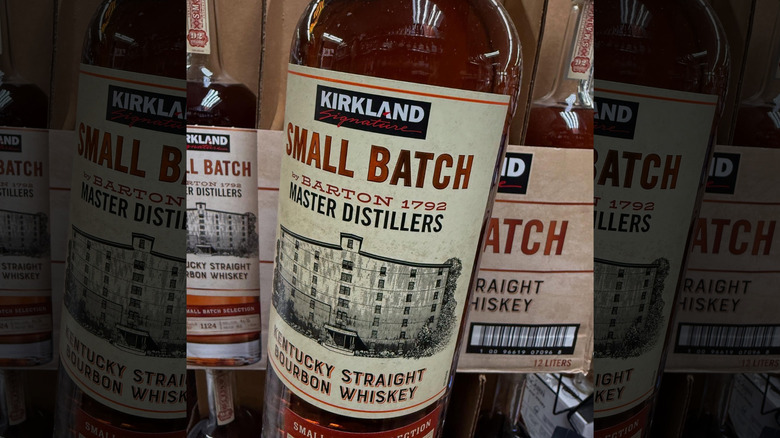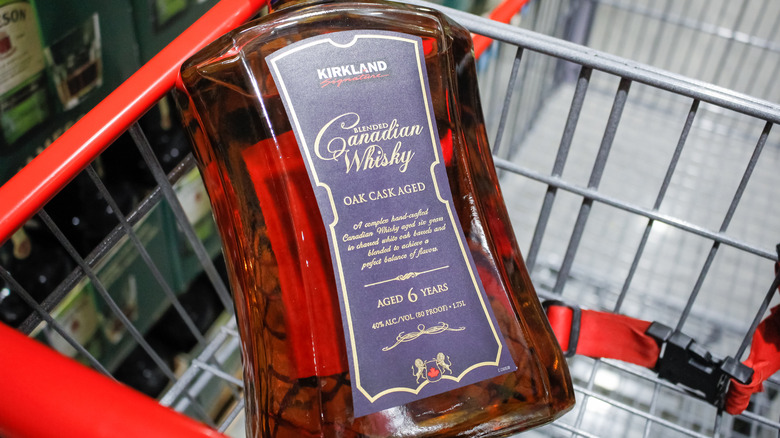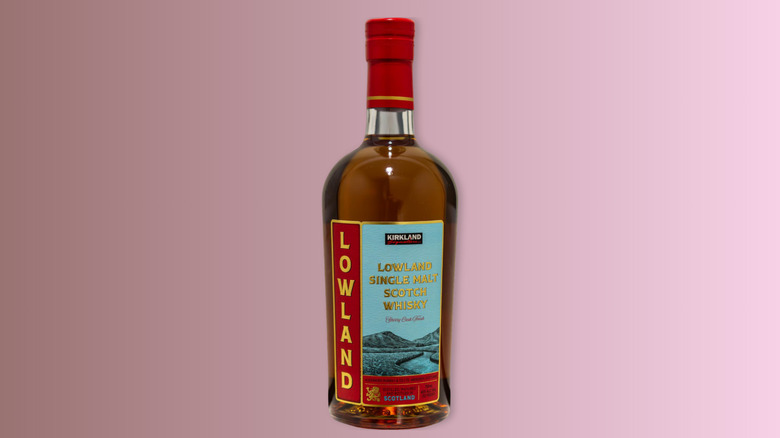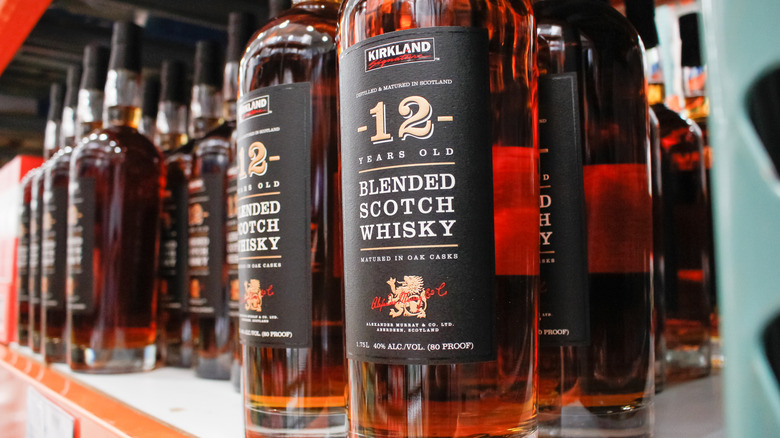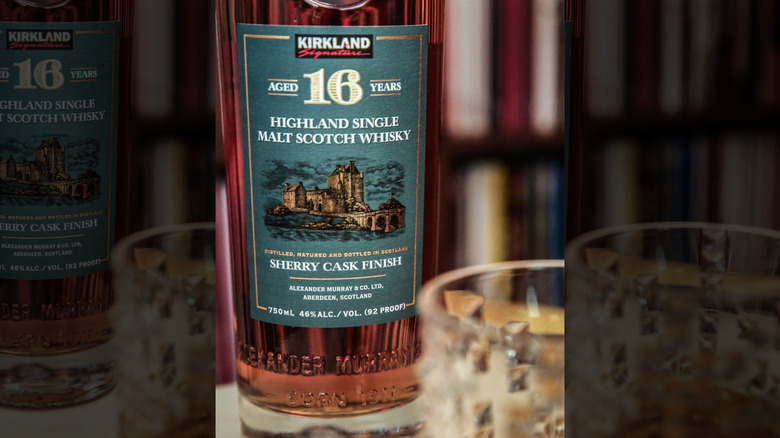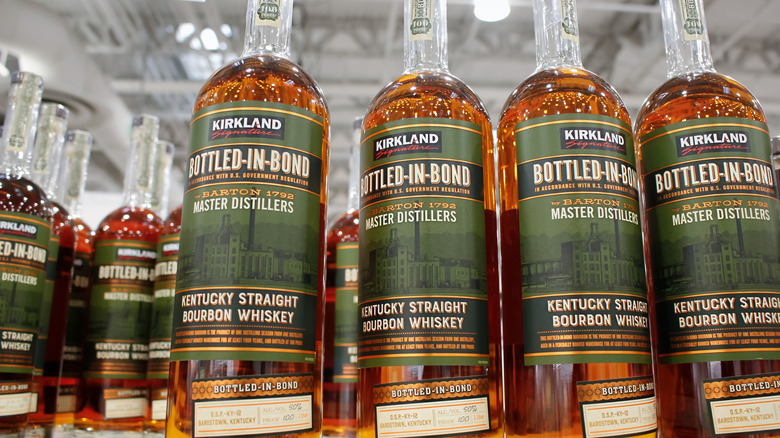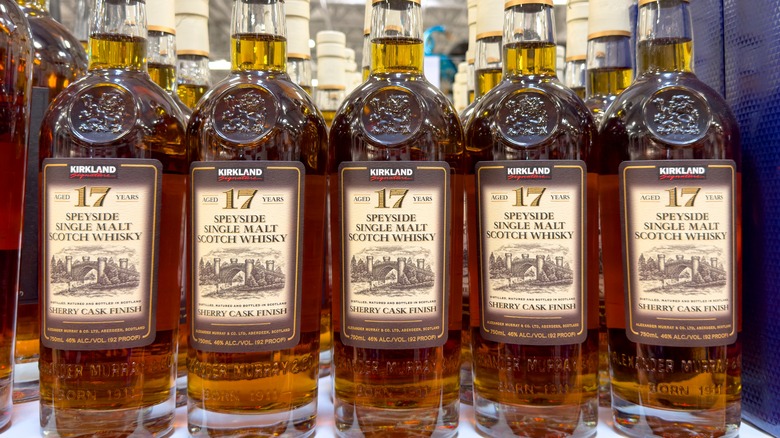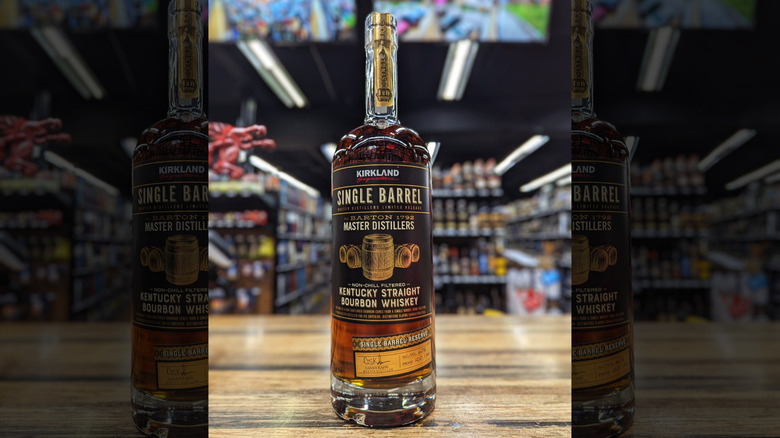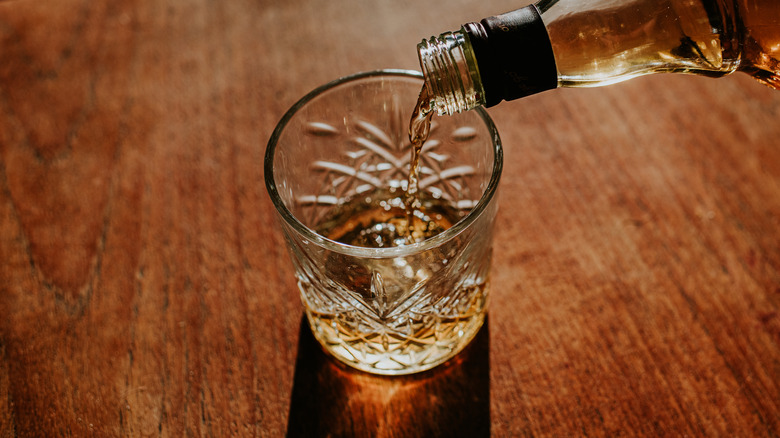Every Costco Kirkland Whiskey (And Whisky) Ranked
As a bar professional with nearly 20 years of experience, I usually lack positive things to say about private-brand spirits. In many cases, the reduced price simply isn't worth the plunge in quality. However, that doesn't mean there aren't some pleasant exceptions in the world of budget liquor. Costco's range features a broad selection of surprisingly good Kirkland Signature spirits that are hard to ignore. Of all of Costco's private-brand liquors, I've found its whiskeys (and whiskies) to be the most consistent, so I'll be ranking every one of them.
It's worth noting that while the quality of Costco whiskey may be consistent, the products themselves aren't. This is mainly because Costco isn't particularly forthcoming about who actually makes its whiskey. You'll see expressions come and go, with age statements increasing or decreasing each year, depending on the whiskey stocks the producers have available. Therefore, this ranking only contains whiskeys available for purchase at the time of this writing. In some states, it's possible to buy Kirkland liquor from third-party retailers, so you may come across bottles I haven't mentioned because they're officially discontinued.
I've sampled the majority of these whiskeys, but in a few cases, I've turned to online reviews for insights. Additionally, it's something of a given that Costco whiskeys are great value for money, so while I've factored that into my rankings, I've been careful to assess the genuine quality of each expression.
11. Blended Scotch Whisky
You can typically make a few assumptions about the quality of scotch from the label alone. Of all the different types of scotch whisky, the blended variety is by far the most common, accounting for almost 90% of all scotch whisky produced worldwide. Lacking the reputation of single malt, blended scotch is made by combining a variety of whiskies made with different grains that are often produced by numerous distillers.
There's nothing to say that a blended scotch can't outshine a single malt, but it's unlikely to be the case here, considering this whisky typically retails for about $25 for a whopping 1.75-liter bottle. Also, the lack of an age statement means the youngest whisky in this blend has likely only been aged for three years, the minimum amount of time for the spirit to legally be labeled "scotch." We know Costco scotch is produced by Alexander Murray & Co., but the company sources its spirits from undisclosed distillers.
While there are certainly worse budget blended scotches out there, Kirkland Signature's version is still arguably the weakest in Costco's range. Its youth is evident from its thin, harsh profile, the malt sweetness is light but not in the elegant sense, and there's not much flavor complexity. I wouldn't drink it neat. However, given the lack of nuanced tasting notes, it would be fine mixed with Coke or ginger ale, or splashed into a warming hot toddy.
10. Irish Whiskey
One of the key differences between Irish whiskey and scotch whisky — besides the different spelling — is that Irish whiskey undergoes triple distillation, whereas scotch is usually only distilled twice. Each round of distillation purifies the spirit further, reducing off-flavors to produce a smoother-tasting whiskey. This is part of why Irish whiskey is a great style for beginners, and why lower-shelf expressions are typically more palatable than their bourbon or scotch equivalents.
Kirkland Signature Irish Whiskey has the style's trademark approachability, but it's nothing to write home about. It's subtly sweet with some light citrus notes and touches of vanilla; however, it lacks the spice and complex character of higher-quality Irish whiskeys. Although not a harsh whiskey, the texture is notably thin despite its smoothness. Priced similarly to Kirkland's Blended Scotch at around $30 for 1.75 liters, you'll struggle to find a cheaper Irish whiskey than this one — but sometimes it's worth shelling out a little more. Personally, if I'm on a tight budget, I'd rather spend more for a bottle of Jameson instead. The jump-in quality and versatility make it worth the increased price.
That said, this stuff would be a solid option for an Irish coffee, where nuanced flavors take a back seat. It'll also work with heavier mixers, especially if you're making drinks for a larger group of people and want to keep the cost down.
9. Small Batch Kentucky Straight Bourbon Whiskey
While Costco aims to keep the identities of its spirit sources secret, its bourbon range is one of the few exceptions to the rule. We know Kirkland Signature bourbon is produced by Barton 1792, an award-winning distillery based in the heart of bourbon country, Bardstown, Kentucky. Although this breeds confidence in Costco's bourbon offerings, unfortunately, the entry-level small batch bourbon falls a little short of expectations.
Kirkland's Small Batch Kentucky Straight Bourbon Whiskey features the usual bourbon notes of caramel and vanilla along with some bold rye-spice notes that are typical of Barton's whiskeys. Despite the lack of an age statement, it's pleasantly smooth with a little oakiness, but it lacks the barrel character of more mature bourbons. However, the "small batch" moniker is meant to denote a whiskey of superior quality, blended from a hand-picked selection of prized barrels, but that doesn't really come across upon tasting. This is by no means an unpalatable budget whiskey, and it's solid value for money at around $20 per liter, but it's certainly the weakest of the Kirkland bourbons.
Again, this isn't a whiskey I'd sip neat, but it'll do the trick in mixed drinks or in cocktails where bourbon doesn't need to be the star of the show. You could easily use it in a Manhattan or boulevardier, where the accompanying ingredients can do the heavy lifting. You could use it for an old fashioned, but I'd opt for a higher-quality bourbon.
8. Blended Canadian Whisky
The whiskies I've covered so far haven't got a ton going for them except for being fairly palatable and extraordinarily cheap. Now, we're getting to the part of the rankings where the Kirkland range starts to impress. Canadian whisky is interesting because it doesn't have as many regulations to conform to as the likes of bourbon or scotch. Most Canadian whiskies are a blend of distillates made with different mashbills, typically corn, rye, wheat, and barley, so you end up with a fair amount of flavor variation between brands and expressions.
While it's unknown who makes Kirkland Signature Canadian Whisky, many believe it to be none other than Crown Royal, Canada's top-selling producer. It's a fair assumption, given how much whisky the company makes and blends, and how similar the Kirkland bottle is to Crown Royal's. There's also the fact that most non-Crown drinkers would likely struggle to differentiate between the two, especially when mixed. Both have a syrupy-sweet vanilla and caramel profile that's balanced with rye-like baking spice notes. The most noticeable difference is Crown Royal has identifiable maple syrup notes and has a touch more barrel character, while Kirkland's version is more caramel-forward with a thinner mouthfeel.
Aged for six years, Kirkland's expression is just as smooth as the more premium product and extremely approachable. Considering the Costco version is nearly 50% cheaper, it's an absolute bargain for a whisky you could drink neat, mix, or use in cocktails.
7. Lowland Single Malt Scotch Whisky
Low-cost blended scotches are extremely common, but it's not often you find single malt whisky at Costco's price points. Single malts differ from blended scotch because they're made using only malted barley and contain whisky produced by a single distillery. This generally results in a more flavorful whisky that's been made under tighter production controls, hence the stronger reputation and higher price.
Scotland has five distinct whisky-producing regions, and the Lowlands are fairly underrepresented. The region's whisky industry experienced significant setbacks in the early 20th century, and until relatively recently, only a handful of distilleries operated in the region. The style is typified by a light, floral character, and Kirkland's Lowland Single Malt Scotch does an excellent job of showcasing it through a clean, gentle malt profile with a bouquet of fresh berry flavors. It's also notably smooth for a whisky with no age statement.
This is another product of Alexander Murray & Co., with no confirmation of the distillery behind the spirit. However, the general consensus is that it's likely distilled by Glenkinchie or Auchentoshan, the two most prominent distilleries that weathered the region's whisky downturn. My money's on the latter, as it's one of the few scotch makers to employ triple distillation, which could account for this whisky's smoothness. For roughly $30 a bottle, you're getting a highly accessible whisky you could easily drink neat, with perhaps just a splash of water to open up the flavors and reduce the heat.
6. 12-Year-Old Blended Scotch Whisky
Costco's 12-Year-Old Blended Scotch is an excellent example of what extended aging can do for a scotch whisky. There's a good chance this expression is a blend of entirely different whiskies from the non-age statement version, but the maturity is evident.
The longer whisky spends in the barrel, the more time the flavors have to round out and develop, creating a far smoother profile. The whisky also picks up more flavors from the barrel itself, not just of oak, but of vanilla, caramel, and spice. It's also common for scotch whiskies to be aged in casks previously used to age bourbon or sherry, which also influences the final taste. While there's a slightly sherried fruit aspect to this scotch, the label only states the whisky was aged in oak casks, and Costco's sherry cask-aged scotches typically highlight that fact on the label. Regardless, this 12-year-old blended scotch wonderfully balances caramel sweetness with warming baking spice notes of cinnamon, nutmeg, and clove. There's a slight peatiness that bolsters the oak character, and you can tell the flavors have had more time to harmonize.
At under $50 for 1.75 liters, it's a solid price for something I'd easily rate above the likes of Dewar's White Label or some lower-end Johnny Walker expressions. It wouldn't be my go-to pick for drinking neat, but it shines with lighter mixers, like soda or ginger ale, and it's an excellent option for scotch whisky cocktails.
5. Highland 16-Year-Old Single Malt Scotch Whisky
The Highlands are, geographically, the largest of Scotland's whisky-producing regions. They also encompass the Speyside and Islands regions; however, Speyside is its own distinct whisky region, and some consider the Islands to be worth classifying separately, too. Because the area is vast, Highland whiskies also tend to vary in style more than those of other regions.
Although I've sampled Costco's discontinued 15-year-old expression, I haven't tried this newer release. Fortunately, my Tasting Table colleague has written an excellent, in-depth review of the Kirkland Highland 16-Year-Old Single Malt Scotch. Consistent with the general online consensus on this whisky, their review vindicates my opinions on the older expression. It has a rich, sherry-forward nose and a palate chock-full of vanilla, dried fruit, and wood spice. It has a honeyed smoothness and some gentle smoke that rides out a moderate finish.
A 750-milliliter bottle will set you back around $60, and you'd struggle to find a single malt of the same age that isn't closer to $100. While I'd typically start to spend more for this style of scotch, it's a superb option for anyone with a more developed whisky palate looking for quality on a budget. It's certainly good enough to drink neat; however, I'd probably add a splash of water or an ice cube to temper the heat and let the flavors open up. You could also use it in scotch-based cocktails that call for premium ingredients, like a Rob Roy or Blood and Sand.
4. Bottled-in-Bond Kentucky Straight Bourbon Whiskey
Bourbon has been around for roughly 250 years, and in the early days of unregulated distilling and unscrupulous bootleggers, the quality of American whiskey was inconsistent to say the least. So, in 1897, the U.S. introduced the Bottle in Bond Act. A bourbon could be labeled bottled in bond if it was produced in a single season by a single distiller, aged in a federal facility for at least four years, and bottled at 50% ABV. The bottled-in-bond label doesn't necessarily guarantee amazing bourbon, but it's still a good sign and shows that Costco takes this expression seriously.
Kirkland Signature's Bottled-in-Bond Bourbon is the next step up from its small batch offering, and reviewers feel the Barton 1792-produced whiskey offers a huge leap in quality. It's complex with a medium body, a gentle honeyed sweetness, and a pleasant amount of oak. The usual caramel and vanilla notes are bolstered with orchard fruit elements and well-balanced with baking spices. At around $25 a liter, many consider this to be the best value-for-money Kirkland bourbon.
You could drink it neat, but at 100 proof, most drinkers would likely benefit from adding water or ice. Its bold character means this whiskey can stand out in cocktails, too, whether it's a cool mint julep, a refreshing whiskey smash, or a smooth old fashioned.
3. Islay Single Malt Scotch Whisky
The Scottish island of Islay — pronounced "eye-luh" — is its own distinct whisky-producing region, and it's known for creating some of the most flavorful scotches in the world. One of the defining features of most Islay whiskies is their intense peatiness, which comes from using burning peat moss to malt the barley. They also embody what are considered "coastal characteristics," referring to notes of brine, seaweed, and iodine.
There's no denying that Kirkland's Islay Single Malt Scotch is a bona fide Islay whisky. The peatiness is evident from the get-go, as are the signature notes of sea salt and iodine. It's slightly sweet, impressively complex, and has a wonderfully long finish. Despite this being a younger scotch with no age statement — I think more time in the barrel would do wonders — it's notably smooth and flavorful.
At around $40 for a 750-milliliter bottle, it's not exactly cheap, but then Islay single malts rarely are. Lagavulin 16 Year would set you back twice that much. That whisky's far more nuanced with better textures, but Kirkland's single malt is excellent for those on a lower budget or who aren't yet sure if they jive with Islay scotch. You can drink it neat — again, I recommend a few drops of water — and it's great if you like making smoky cocktails, like Penicillins or peaty hot toddies.
2. Speyside 17-Year-Old Single Malt Scotch Whisky
Geographically speaking, the Speyside whisky region is pretty small. However, it's home to half of Scotland's whisky distilleries, which take advantage of the area's high-quality, low-mineral water supply. The large number of Speyside distilleries means there's variety in the regional style, although the signature flavors are creamy vanilla, smooth honey, and fresh orchard fruits.
I haven't tried Kirkland Signature Speyside 17-Year-Old Single Malt Scotch, but I have tried the discontinued 19-year-old expression. The latter was fairly tannic with a big sherry profile of dried fruits, citrus peel, and molasses. This newer, younger expression is said to be pretty similar, albeit with a more subdued sherry profile from less time in casks. Truthfully, this doesn't sound like a bad thing, making the 17-year-old version sound more approachable than its predecessor. I've also seen this whisky compared to the world-renowned Macallan, which is no small compliment.
Overall, this appears to be a superb whisky for showcasing the Speyside style. At around $60 for a 750-milliliter bottle, it's a bargain considering its age. This is one I'd save for drinking neat, although like most of Costco's whiskies, it's a little hot on the front end and could do with some water or ice to make the most of it.
1. Single Barrel Kentucky Straight Bourbon Whiskey
Where small batch bourbons are made by blending whiskeys from a small selection of barrels, single barrel bourbons are drawn from just one cask. This means that, for Kirkland's Single Barrel Bourbon, the folks at Barton 1792 are hand-picking a sole barrel from which to bottle. While the distillery will likely be saving its very best barrels to sell under the 1792 brand, it means that Costco is able to offer a high-proof whiskey of superior quality. This single barrel bottle is easily the best of Costco's private-brand bourbons, and I can't help but rank it first among its entire whiskey range.
There's plenty of smooth vanilla, luxurious caramel, and toasted oak, countered by Barton's signature rye spice and hints of nuts. The mouthfeel is thick and chewy, helped in part by the weighty 60% ABV strength, and the finish is long and warming. Single barrel bourbons tend to command high price tags due to their strength, quality, and exclusivity, but the Kirkland offering is a mere $30 for 750 milliliters. Taste-wise, it holds its own against bourbons two or three times that price.
It's a bit too strong to drink without dilution. And I recommend trying it in an old fashioned with a few different bitters combinations to highlight its nuanced and varied flavors.
Methodology
To create this ranking, I first whittled down Costco's Kirkland Signature whiskey range to expressions that are currently available for purchase in the majority of Costco stores. As I mentioned before, the range changes frequently due to the nature of how Costco sources its whiskey, and I didn't want to include expressions that aren't likely to stick around. Fortunately, I've sampled the majority of these whiskeys, so the reviews are based on my personal experience. For the three whiskeys I haven't tried, I turned to online reviews and ratings to determine their placement in the rankings. It's also worth mentioning that of the three I haven't tried, I've tasted the discontinued variants of two of them.
Costco's private-brand whiskeys are pretty much always going to be cheaper than their name-brand equivalents. Value for money was still a factor in my ranking choices, but it wasn't the most important aspect. Rather, I wanted to create this list based on the true quality of each whiskey, and whether they'd maintain their positioning if they were priced closer to name-brand products.
